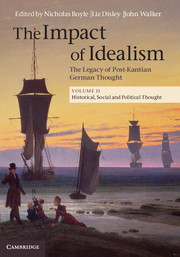Book contents
- Frontmatter
- Contents
- List of Contributors
- Acknowledgements
- List of Abbreviations
- Introduction: Idealism in historical, social and political thought
- 1 From transcendental idealism to political realism
- 2 The public of the intellectuals – from Kant to Lyotard
- 3 Idealism and the idea of a constitution
- 4 German Idealism and Marx
- 5 Ethos, nature and education in Johann Erich von Berger and Friedrich Adolf Trendelenburg
- 6 The concept and philosophy of culture in Neo-Kantianism
- 7 After materialism – reflections of Idealism in Lebensphilosophie: Dilthey, Bergson and Simmel
- 8 ‘Rationalisation’, ‘reification’, ‘instrumental reason’
- 9 Freedom within nature: Adorno on the idea of reason's autonomy
- 10 German neo-Hegelianism and a plea for another Hegel
- 11 Idealism and the fascist corporative state
- 12 Love and recognition in Fichte and the alternative position of de Beauvoir
- 13 Hegel's concept of recognition and its reception in the humanist feminism of Simone de Beauvoir
- 14 Giving an account of oneself amongst others: Hegel, Judith Butler and social ontology
- 15 Idealism in the German tradition of meta-history
- Bibliography
- Index
- References
14 - Giving an account of oneself amongst others: Hegel, Judith Butler and social ontology
Published online by Cambridge University Press: 05 December 2013
- Frontmatter
- Contents
- List of Contributors
- Acknowledgements
- List of Abbreviations
- Introduction: Idealism in historical, social and political thought
- 1 From transcendental idealism to political realism
- 2 The public of the intellectuals – from Kant to Lyotard
- 3 Idealism and the idea of a constitution
- 4 German Idealism and Marx
- 5 Ethos, nature and education in Johann Erich von Berger and Friedrich Adolf Trendelenburg
- 6 The concept and philosophy of culture in Neo-Kantianism
- 7 After materialism – reflections of Idealism in Lebensphilosophie: Dilthey, Bergson and Simmel
- 8 ‘Rationalisation’, ‘reification’, ‘instrumental reason’
- 9 Freedom within nature: Adorno on the idea of reason's autonomy
- 10 German neo-Hegelianism and a plea for another Hegel
- 11 Idealism and the fascist corporative state
- 12 Love and recognition in Fichte and the alternative position of de Beauvoir
- 13 Hegel's concept of recognition and its reception in the humanist feminism of Simone de Beauvoir
- 14 Giving an account of oneself amongst others: Hegel, Judith Butler and social ontology
- 15 Idealism in the German tradition of meta-history
- Bibliography
- Index
- References
Summary
The concept of recognition in Hegel's Phenomenology of Spirit has had, and continues to have, a profound effect on twentieth-century philosophy. Emerging as a key topic in mid-twentieth-century Continental thought, the concept is more relevant than ever to early twenty-first-century philosophy on both sides of the Atlantic. Whilst philosophers writing in the Continental tradition have been more interested in the ontological conditions of recognition and the relation of this issue to questions of, as Lévinas would put it, first philosophy, the political connotations have not been neglected, and the question of the concept of recognition as a way of understanding the political has been explored in the works of Axel Honneth, Jürgen Habermas, Edith Düsing and Michael Theunissen, as well as Alexandre Kojève's original seminal interpretation.
These accounts and criticisms of Hegel's concept have attempted, to a greater or lesser extent, to flesh out the concept so that it might be useful in today's political world. Receptions of Hegel's concept of recognition in the English-speaking world have focused more strongly on the directly political and less on the concept of recognition as a part of Hegel's system in general, that is, less, if at all, on the ontological and epistemological aspects of the concept. One focus of this kind of interest in recognition is what Nancy Fraser calls the ‘identity model’, whose proponents
transpose the Hegelian recognition schema on to the cultural and political terrain [and] contend that to belong to a group that is devalued by the dominant culture is to be misrecognized, to suffer a distortion in one's relation to one's self.
This is one locus of the continued feminist interest in Hegel's theory of recognition, particularly combined with Miranda Fricker's recent work on epistemic injustice, although Simone de Beauvoir's more ontologically inclined analysis has remained influential, and the target of much criticism. The political debate on recognition has been truly international, and has crossed traditional disciplinary and subdisciplinary borders. An excellent example of this crossing can be seen in the 2003 volume, Redistribution or Recognition?, coauthored by Fraser and Honneth. Whilst the question of whether a Hegelian concept like recognition can be divorced from its ontological and dialectical scheme remains one which divides analytical and Continental philosophers, it would not be true to say that there are two separate and unconnected discussions taking place.
- Type
- Chapter
- Information
- The Impact of IdealismThe Legacy of Post-Kantian German Thought, pp. 312 - 330Publisher: Cambridge University PressPrint publication year: 2013



